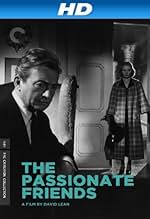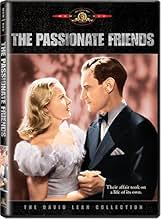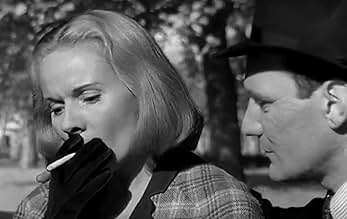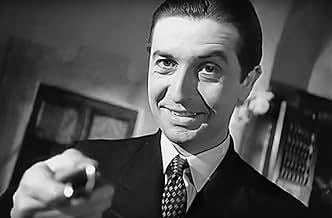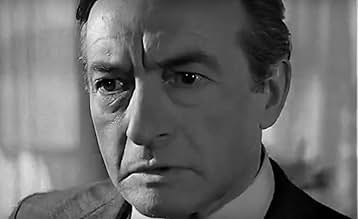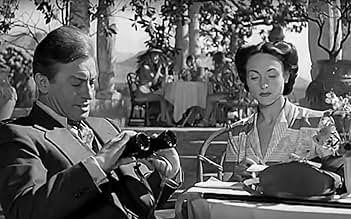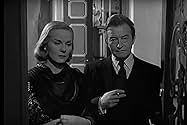AVALIAÇÃO DA IMDb
7,2/10
3,4 mil
SUA AVALIAÇÃO
Uma mulher conhece um homem cujo amor ela rejeitou anos atrás.Uma mulher conhece um homem cujo amor ela rejeitou anos atrás.Uma mulher conhece um homem cujo amor ela rejeitou anos atrás.
- Direção
- Roteiristas
- Artistas
- Prêmios
- 2 vitórias e 1 indicação no total
Hélène Burls
- Flowerwoman
- (não creditado)
Amy Dalby
- Lady on Underground
- (não creditado)
Lisa Daniely
- Cinema Usherette
- (não creditado)
Max Earle
- Third Man - Albert Hall
- (não creditado)
Edward Evans
- Underground Ticket Officer
- (não creditado)
Arthur Howard
- Smith - Butler
- (não creditado)
John Huson
- First Man - Albert Hall
- (não creditado)
Wilfrid Hyde-White
- Lawyer
- (não creditado)
Charles Lloyd Pack
- Man Drinking with Stratton
- (não creditado)
Guido Lorraine
- Hotel Manager
- (não creditado)
Ina Pelly
- Second Woman - Albert Hall
- (não creditado)
Helen Piers
- First Woman - Albert Hall
- (não creditado)
Marcel Poncin
- Hall Porter
- (não creditado)
Avaliações em destaque
This David Lean romance seems to have been swept under the carpet and yet it may be his most underrated masterpiece, (it's infinitely preferable to such elephantine fare as "Ryan's Daughter" and "Doctor Zhivago"). It marked the first time Lean would abandon the studio for more exotic locations, (in this case, the Swiss Alps), and seems designed as a vehicle for his wife, Ann Todd, who is outstanding as the respectable English wife who dallies with an old flame who happens to check into the room next door at the hotel she's staying in while on holiday. He's Trevor Howard and it's as if this is what might have happened in "Brief Encounter" had the lovers a bit more chutzpah.
Howard, too, is superb, (he always was; he remains one of the most underrated of all the great actors), and Todd's husband is the consistently excellent Claude Rains at his very best. As a tale of a genteel marriage threatened by genteel adultery it's beautifully done and why it isn't more highly appreciated is something of a mystery. If, like me, you believe Lean to be one of the great directors then this is essential viewing.
Howard, too, is superb, (he always was; he remains one of the most underrated of all the great actors), and Todd's husband is the consistently excellent Claude Rains at his very best. As a tale of a genteel marriage threatened by genteel adultery it's beautifully done and why it isn't more highly appreciated is something of a mystery. If, like me, you believe Lean to be one of the great directors then this is essential viewing.
H. G. Wells wrote his novel in 1913 and it was first filmed by Maurice Elvey in 1922. By all accounts David Lean was reluctant to take it on and did so only as a favour to Ronald Neame. Once he agreed to do it however nothing less that the very best would do. Although Eric Ambler is credited with the screenplay, he was aided considerably by Lean and Stanley Haynes. Ann Todd with whom Lean had initial 'temperament' problems and Trevor Howard are both superb as the lovers. Howard replaced Marius Goring who would not have suited. Lean had a habit in his films of sometimes making an actor in the cast feel 'left out'. In this case the victim was Howard. The film actually belongs to Claude Rains for whom Lean had the deepest admiration. His portrayal of the betrayed husband is consummate and a masterclass in great film acting. Lean's own verdict on the film? 'Very nearly very good but a little cold'. I feel he was being unduly harsh on himself as anyone who is left unmoved by the final scene has a heart of stone. The film was criticised at the time for its extensive use of flashbacks. Ones heart goes out to those poor souls in the audience who get so easily confused! Lean's mastery of the visual, his 'cutter's' instinct and the excellent performances make this an absorbing and immensely satisfying film.
The Passionate Friends (1949)
You wonder how this movie would be told without the Hays Code (and its British counterpart) hovering over the scriptwriter and director. But here we have David Lean's version of the much older H.G. Wells novel (from just before WWI) with all the restraint of movie romances of the period. That is, without our modern idea of passion.
And that's one of the things that makes this really work. It's not about making love on the sly, or going rapturous on screen. It's about the complicated emotional needs and conflicts of three people. That's what passion boils down to, at least in a way that we want to spend time with. And though this is not a full fledged love triangle like "Jules and Jim" (it's one woman caught between two men), it does play with the clashing and melding of three personalities and their passions.
Oddly, you learn fairly soon that the passion of the older man, played by Claude Rains, is deliberately not passionate. That's not what he wants in love. The younger man (not by much) is played by Trevor Howard and he is a sweetheart, with a family, and yet he still has that pure ideal love for the woman he can't shake. Even though she is married to the older man.
The woman holds it all together, both in the story, since she is involved with both men, and in the movie, played with amazing force and nuance by Ann Todd. When she first appeared on screen, thinking to herself on a plane taking off, I thought she was a little like Joan Fontaine, and since I love Fontaine, I was going to be open to this inferior version. But she wasn't inferior one bit. The longer the movie went on, the more I realized what a deeply felt, complex performance Todd gives. She not only has to be a different kind of woman with each of the men, she has to do so in different time periods over about eight years. Great stuff. I want to watch it again just to appreciate her. She was almost wholly a British actress, not moving to Hollywood, and so she never had an American audience the way some of the more famous stars here naturally did. Too bad for everyone.
The movie, as such, has a little inevitability to it--not that we know how it will end, exactly, but that we know how it will probably end, the one or two main options. The rivalry, the jealousy, the caught looks across a train station, the views from the Italian Villa, all the clichés are here. They are all perfectly handled, for sure, but an edge of originality would have helped a lot. I'm very curious to read the Wells book just to see how complex he makes the woman, and the story. And to check the ending he had in mind in 1913.
Lean, the director, is a legend of course. He made so many really fine films, important ones, it's easy to overlook this one. Even the slightly similar (in feel) "Brief Encounter" from 1945 casts a huge shadow here. Throw in "Lawrence of Arabia," "Dr. Zhivago," "Blithe Spirit," "Bridge over the River ." You get the idea.
See this. Expect nothing sensational, and you'll be sucked into a really superb, conventional, beautiful romantic drama. I just read (and gave a thumbs up) to a long review for this film that seems incredibly perceptive, but which maybe forces too much analysis onto the motives of the players here--especially for someone who hasn't seen it yet. I suggest getting sucked in and taking the advice to be patient, but also forging your own view of the events and hearts involved.
You wonder how this movie would be told without the Hays Code (and its British counterpart) hovering over the scriptwriter and director. But here we have David Lean's version of the much older H.G. Wells novel (from just before WWI) with all the restraint of movie romances of the period. That is, without our modern idea of passion.
And that's one of the things that makes this really work. It's not about making love on the sly, or going rapturous on screen. It's about the complicated emotional needs and conflicts of three people. That's what passion boils down to, at least in a way that we want to spend time with. And though this is not a full fledged love triangle like "Jules and Jim" (it's one woman caught between two men), it does play with the clashing and melding of three personalities and their passions.
Oddly, you learn fairly soon that the passion of the older man, played by Claude Rains, is deliberately not passionate. That's not what he wants in love. The younger man (not by much) is played by Trevor Howard and he is a sweetheart, with a family, and yet he still has that pure ideal love for the woman he can't shake. Even though she is married to the older man.
The woman holds it all together, both in the story, since she is involved with both men, and in the movie, played with amazing force and nuance by Ann Todd. When she first appeared on screen, thinking to herself on a plane taking off, I thought she was a little like Joan Fontaine, and since I love Fontaine, I was going to be open to this inferior version. But she wasn't inferior one bit. The longer the movie went on, the more I realized what a deeply felt, complex performance Todd gives. She not only has to be a different kind of woman with each of the men, she has to do so in different time periods over about eight years. Great stuff. I want to watch it again just to appreciate her. She was almost wholly a British actress, not moving to Hollywood, and so she never had an American audience the way some of the more famous stars here naturally did. Too bad for everyone.
The movie, as such, has a little inevitability to it--not that we know how it will end, exactly, but that we know how it will probably end, the one or two main options. The rivalry, the jealousy, the caught looks across a train station, the views from the Italian Villa, all the clichés are here. They are all perfectly handled, for sure, but an edge of originality would have helped a lot. I'm very curious to read the Wells book just to see how complex he makes the woman, and the story. And to check the ending he had in mind in 1913.
Lean, the director, is a legend of course. He made so many really fine films, important ones, it's easy to overlook this one. Even the slightly similar (in feel) "Brief Encounter" from 1945 casts a huge shadow here. Throw in "Lawrence of Arabia," "Dr. Zhivago," "Blithe Spirit," "Bridge over the River ." You get the idea.
See this. Expect nothing sensational, and you'll be sucked into a really superb, conventional, beautiful romantic drama. I just read (and gave a thumbs up) to a long review for this film that seems incredibly perceptive, but which maybe forces too much analysis onto the motives of the players here--especially for someone who hasn't seen it yet. I suggest getting sucked in and taking the advice to be patient, but also forging your own view of the events and hearts involved.
This film surprised me a lot. I watched it merely out of curiosity; by the end of the film, I was struck by Ann Todd's performance and had to watch the film twice back-to-back. She expressed her character's inner turmoil so well that I wonder if she was playing herself. I profess I don't watch a lot of movies, barely up to 2,000 films. However, that is only because I am damn picky.
This is rather a mature story of romance. How a relationship could evolve from a marriage of convenience to a real thing of beauty between two people. How one's maturity could evolve from a real thing of passion to a mental state of contentment and stability. It's also a story of irrational jealousy that could potentially negate a prosperous family life.
This is a good example of a film where filmmakers do not have to resort to gratuitous, meretricious scenes to portray lust or passion.
This is rather a mature story of romance. How a relationship could evolve from a marriage of convenience to a real thing of beauty between two people. How one's maturity could evolve from a real thing of passion to a mental state of contentment and stability. It's also a story of irrational jealousy that could potentially negate a prosperous family life.
This is a good example of a film where filmmakers do not have to resort to gratuitous, meretricious scenes to portray lust or passion.
This Rank/Cineguild production directed by David Lean is based on a novel by H G Wells, here adapted by Lean and Stanley Haynes, though with a screenplay credited to Eric Ambler. Although the plot is about a triangle, Lean's focus is on Ann Todd as the woman between two men, her husband and the man who was her first love but whom she refused to marry. Her situation is presented in an exchange between the man, Trevor Howard and Todd - "If two people really love each other they want to be together. They want to belong to each other", Todd - "I want to belong to myself", "Then your life will be a failure". However in the tradition of upper class Brits, Todd's life of failure means a marriage to a successful banker, Claude Rains. The narrative has an unusual triple flashback structure, which is perhaps why it needed three writers, with the present being narrated by Todd with the prospect of a divorce, and flashbacks to the vacation in Switzerland where the instigating incident occurs, Todd's memory/flashback of 9 years earlier re-meeting Howard, and small memories of their first romance. The initial meeting is tainted by lines like Todd's "Why can't we be in love without the clutching and gripping", though later Todd admits to "not being a very good person". Howard's character has his ambiguities too, being a university biology lecturer who knowingly has an affair with a married woman. The infidelity gets a funny spin by Rains' business with Germany and Italy pre-WW2, and Rains saying he has "a taste for intrigue", though the film being made post-WW2 allows him to speak of the "Teutonic hysteria" of the Germans. In spite of some of Lean's technical touches, the thing that de-passionates the situation is Todd, in her first film for her then husband. Whilst at times she resembles Garbo, the rather butch Todd lacks the divine one's expressiveness, with Lean reduced to filming her running from Howard in slow motion to give her some lyricism. All three of the leads are oddly lit indelicately, perhaps to suggest that all this passage of time has aged them, but this with Todd, adds to the destruction of romantic intent. Lean provides a vocal montage of telephone conversations, cuts from a kiss to a bunch of flowers, doors slamming to a typewriter slide of the divorce document, gives Rains a cuckold paranoid montage, and has a "Keep Smiling" poster featured in the background of the climactic scene in the train underground, though the idea of Todd not buying a ticket before she enters rather pre-empts things. Rains has the audience empathy, even if the odd way he stand in a ¾ pose when he confronts someone seems silly. He is the more emotional of the three, but because of the British standards of polite behaviour, his yells are either heard off-camera or with his back to us. The best scene reads as Hitchcock-influenced with Rains dictating to his secretary and Lean continually cutting to a pair of tickets to a play Todd and Howard go to see. The title First Love gets a comic payoff when we hear it is a musical with a fatuous title song.
Você sabia?
- CuriosidadesThe second book that Mary Justin and Steven Stratton quote from after dinner ("From the music they love you should know the texture of men's souls.") is roughly taken from English novelist and playwright John Galsworthy's "The Man of Property" (published in 1906), the first in a series of three novels and two interludes comprising the "The Forsyte Saga" (published in 1922). The actual quote is: "By the cigars they smoke, and the composers they love, ye shall know the texture of men's souls."
- Erros de gravaçãoWhen Steven barges into Howard's office, he is shown starting to close the door, followed by the sound of a door closing. However, in the subsequent shot, the door is open again.
- Citações
Mary Justin: I'm not a very good person, Steven. I wanted your love - and I wanted Howard's affection and the security he could give me.
Professor Steven Stratton: I can give you security too, and more than affection.
Mary Justin: You don't really know me at all. My love isn't worth very much.
- ConexõesFeatured in Discovering Film: Claude Rains (2015)
Principais escolhas
Faça login para avaliar e ver a lista de recomendações personalizadas
- How long is The Passionate Friends?Fornecido pela Alexa
Detalhes
- Data de lançamento
- País de origem
- Idiomas
- Também conhecido como
- Apasionada
- Locações de filme
- Le Brévent, Chamonix, Haute-Savoie, França(cable car outing at Brévent in front of Pic du Midi)
- Empresas de produção
- Consulte mais créditos da empresa na IMDbPro
Bilheteria
- Faturamento bruto mundial
- US$ 40.335
- Tempo de duração
- 1 h 35 min(95 min)
- Cor
- Proporção
- 1.37 : 1
Contribua para esta página
Sugerir uma alteração ou adicionar conteúdo ausente


